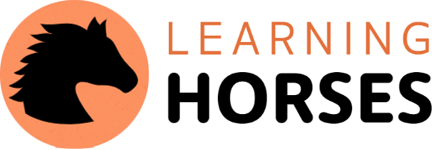Out of all the horses I’ve owned, few have been as rewarding as my senior horses. While baby horses in a field can stop traffic and our curly horses draw attention at horse shows, caring for an old horse is uniquely rewarding.
In this piece, you’ll learn all about old horses- caring for them, knowing when to stop riding, buying, selling, and unique health needs. You’ll uncover insights into their aging process, dietary needs, and basic care. Interspersed through this article, you’ll also find a collection of my own photographs of the senior horses I’ve cared for through my decades as a horse owner, riding coach, veterinary assistant, and tack store owner.
Old Horse Basics:
First, let’s cover the basics:
- 🏷️ Terms: While young horses have many terms like foal, colt, and filly, old horses don’t have a “correct” name. They might be referred to as veterans, senior horses, or geriatric equines. If they’re extremely well-trained, calm, and friendly, they might be called “bombproof.”
- ⏳ Lifespan: Horses live for around 15 to 25 years, though some individual horses have lived into their 30s. Genetics, diet, exercise, medical care, and overall living conditions impact how long a horse can live. Regular veterinary check-ups, quality feed, opportunities for socialization, and even climate can help old horses thrive in their later years.
- 💰 Price: Initially, old horses are cheaper to buy than young horses. In many cases, however, the cost of senior horse supplements, veterinary care, and medications may offset the cheaper price.
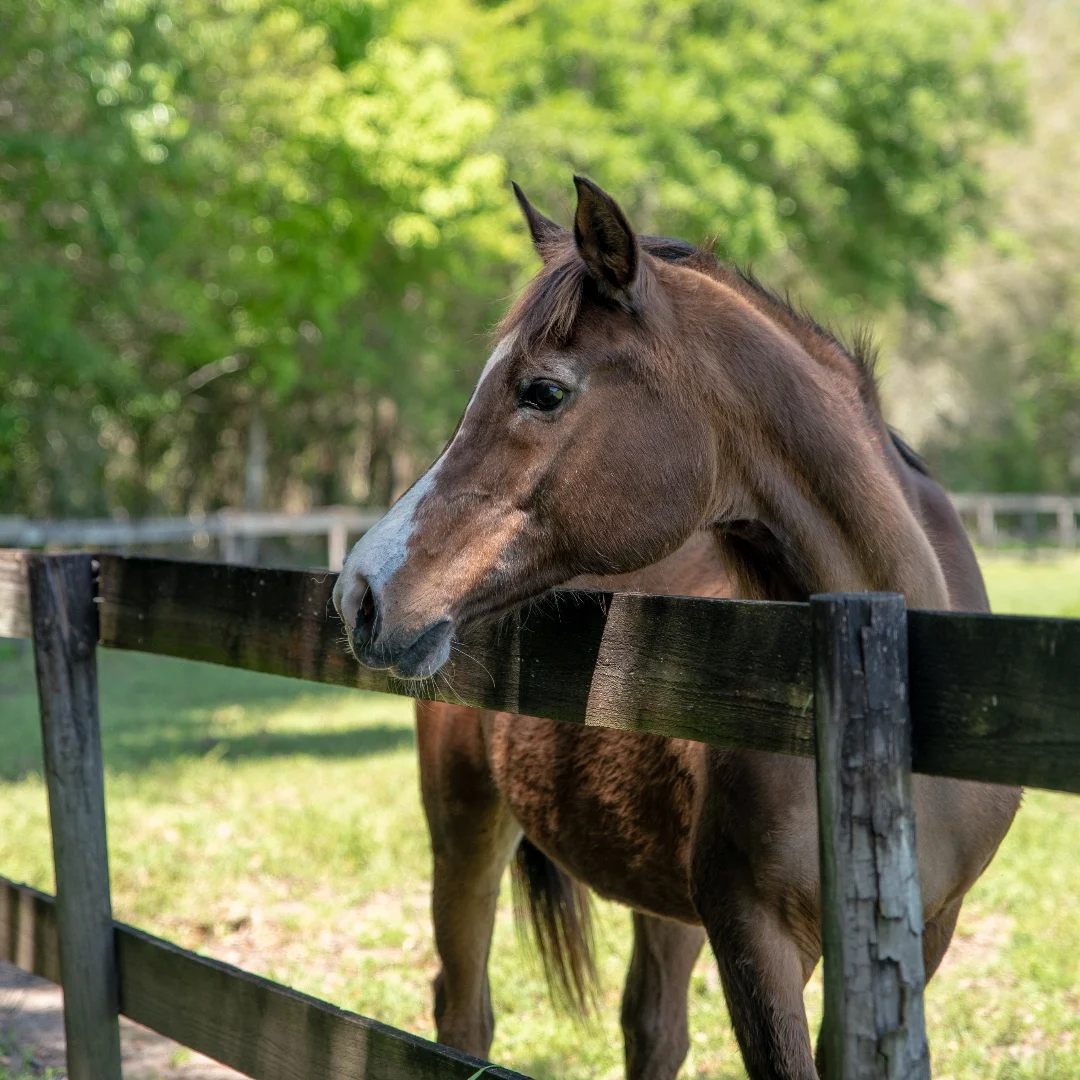
The Journey of Aging Horses
A horse’s behavior and usefulness change over a lifetime. Here’s a typical timeline for a horse’s life:
| Horse Age Range | Typical Milestones |
|---|---|
| Age 0-1 | Birth, growth, and learning social skills from other horses. |
| Age 1-2 | Weaning, increasing human contact and handling. |
| Age 2-4 | Most intense training period. Usually saddle trained. |
| Age 4-6 | Training continues, may begin performance competition. |
| Age 6-10 | With consistent riding, skill & muscle tone grow. Peak performance. |
| Age 10-15 | Prime riding years. Now experienced horse is fun for riders. |
| Age 15-20 | May show signs of aging, reduced workload but still working. |
| Age 20-25 | Senior horse, health management becomes a primary concern. |
| Age 25+ | Advanced old age, usually unrideable due to declining health. |
When an aging horse advances in years, it graduates from the steady, high-performance peak of ages 6-12 and begins a slow decline. Many horses can carry riders into their late 20’s, but likely aren’t able to do horse sports such as jumping, trail riding, barrel racing, or speed events due to declining balance and muscle tone.
The Natural Transition to Kid’s Horse
Many senior horses go into semi-retirement in their 20’s. Often, horses who’ve competed in performance events or served as working horses through their prime years become lesson horses in their old age. These older horses called “schoolmasters” in the riding stables where they are used for riding lessons, are beloved and often cherished. These old horses are rewarded for their years of work with young, lighter riders, lots of love and attention, and usually lots of mane braiding from their doting students. 🐴💚
Behavior problems in old horses:
Pain and fear are the two primary reasons horses bite. As old age creates more aches and pains, old horses might be more likely to bite. Similarly, as a horse’s sight or sense of hearing are affected by age, they may startle more easily. This startle response can take the form of biting or spooking more often. Still, these horses are unlikely to bite and kick- after decades of training many older equines have a low instinct to bite or kick when startled.
🥕🐴 Nutritional Needs of Aging Horses:
Aging horses primarily rely on a diet tailored to their changing requirements. As horses advance in age, joint health, dental health, and digestive issues often prompt adjustments in feeding.
What Old Horses Eat: Good foods for old horses include easily digestible senior horse pellets or feeds formulated for aging horses, soft hay for better digestion and dental health, and joint supplements like glucosamine for joint support. Hay may need to be soaked before feeding to prevent dehydration and aid digestion.
🚫✋🏼🍏 Refrain from offering old horses carrots and apples, even in moderation! Old horses have delicate stomachs, and their ability to digest horse treats might be compromised.
Anticipating the Expenses of Caring for Aging Horses
Here’s what to consider before you embark on the journey of caring for an aging horse:
According to our research,1
Older horses (age 15-20) are generally priced higher than younger horses (age 3-7) by an average of 43%. However, for horses aged 20+, the opposite is true. Horses age 20+ are 27% cheaper than the average 3-7 year old horse.
- Price Range Distribution:
- Younger horses (age 3-7) are more available across a wider price range, from $1,000 to $30,000.
- Older horses (15+ and 20+) have a more concentrated distribution within the mid-tier price ranges of $2,500 to $10,000.
- Highest Priced Horses by Age:
- Among the age groups, horses aged 3-7 are most frequently offered in the $10,000 to $30,000 range.
- Horses aged 15+ and 20+ are rarely priced above $10,000, with only a small percentage falling into the higher price ranges.
- Affordability for Beginners:
- For individuals new to horse ownership, older horses (15+ and 20+) offer a more accessible entry point due to some being priced under $1,000.
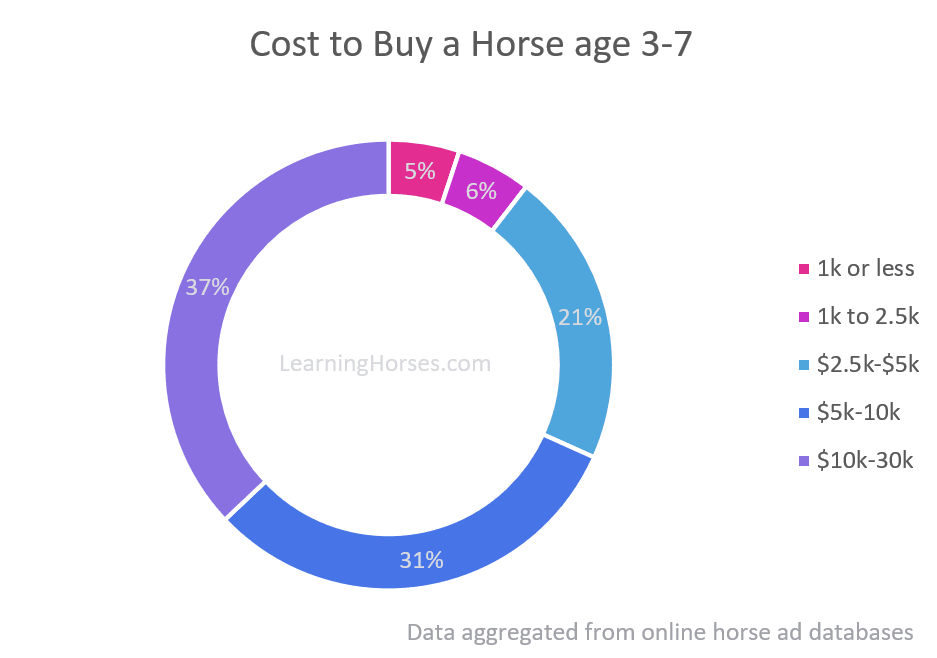
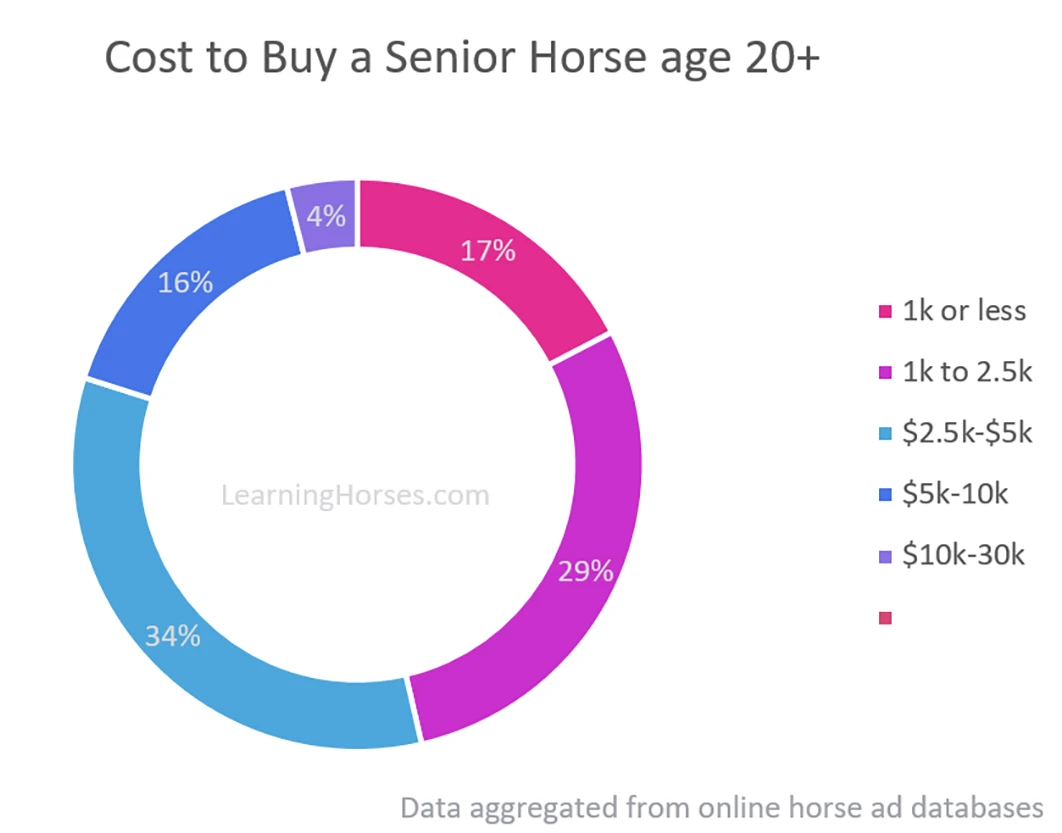
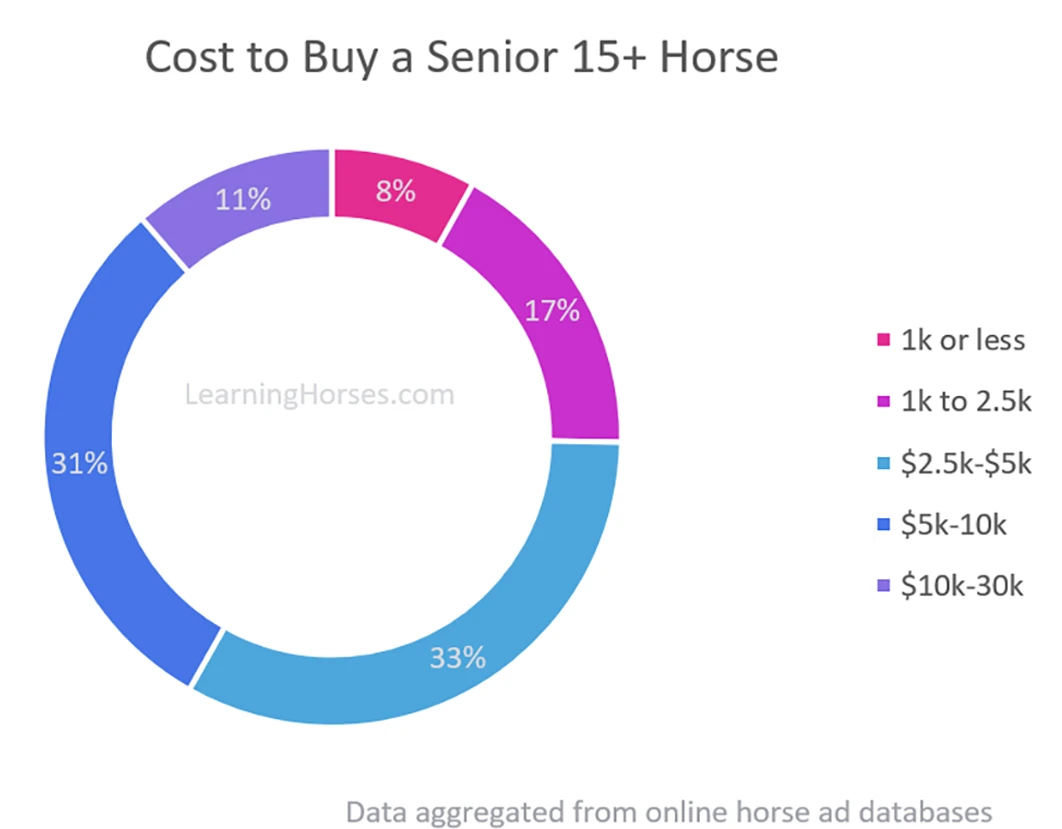
Caring for an Old Horse
Care for older horses involves a compassionate, realistic look at their health status and a willingness to adjust their riding or work schedule.
When it comes to deciding when to stop riding an old horse, there’s no one-size-fits-all answer.
It really depends on how your horse is feeling, how fit they are, and what shape they’re in overall. Lots of horses can keep enjoying rides well into their late teens or early twenties, as long as they’re feeling good and getting the right care. Just keep an eye out for things like them being uncomfortable, moving a bit stiffly, or any signs that they might not be up for it.
Some horses might need to retire earlier due to age-related issues, while others can handle lighter rides even in their senior years. Talking to a vet or a horse pro who knows your horse well can give you feedback on when it’s time to give riding a rest.
| Health Concern Description | Appropriate Riding Load Adjustments |
|---|---|
| Stiffness or joint pain in the morning | Light riding, gentle exercises, and warm-ups. |
| Stiffness or joint pain most days | Reduce riding frequency, shorter rides. |
| Weight loss or muscle atrophy | Reduce intensity of riding, provide extra feed. |
| Decreased energy levels | Shorter riding sessions, longer rest periods. |
| Frequent stumbling or tripping | Ride only on even surfaces, consider retiring. |
| Chronic lameness or soundness issues | Stop riding or limit to small children. |
| Reduced coordination or balance | Stop riding altogether |
| Signs of discomfort during riding | Stop riding altogether. |
Additional Concerns When Caring for Old Horses
Choosing Boarding Options. If you choose a senior horse and board it at a horse boarding facility, it’s crucial to assess potential options carefully. Facilities experienced in accommodating senior equines will offer the right food and care, which are vital for the well-being of aging horses.
Herd Dynamics. Aging horses, like their younger counterparts, thrive when in the company of other horses. Interaction with older horses teaches valuable manners. Socializing with a mixed herd can positively influence an aging horse’s mind, which can impact health.
Financial Planning. The initial purchase cost is just the beginning of the financial commitment associated with owning an aging horse. As your horse matures, you’ll need to invest in new equipment as it outgrows its gear. Regular veterinary care, farrier visits, and potential training costs also contribute to the ongoing budget.
Final Thoughts on Old Horses
In conclusion, the journey of owning and caring for senior horses can be a unique and fulfilling experience. From understanding their changing dietary needs to navigating the transition from riding to retirement, caring for an aging horse requires compassion, flexibility, and a keen eye for their evolving well-being. While young and flashy horses may catch the eye, the bond shared with an aging horse is special!
- LearningHorses.com’s research team gathered data from over 10,000 horse sale ads in Fall 2023, using three popular online horse classified ad sites. Our team then analyzed the data based on color, breed, price, and other factors. The numbers and percentages featured in this article are based on the analysis of this data [↩]
